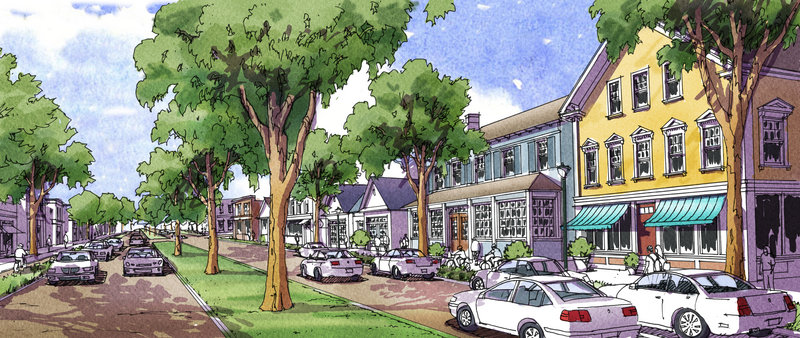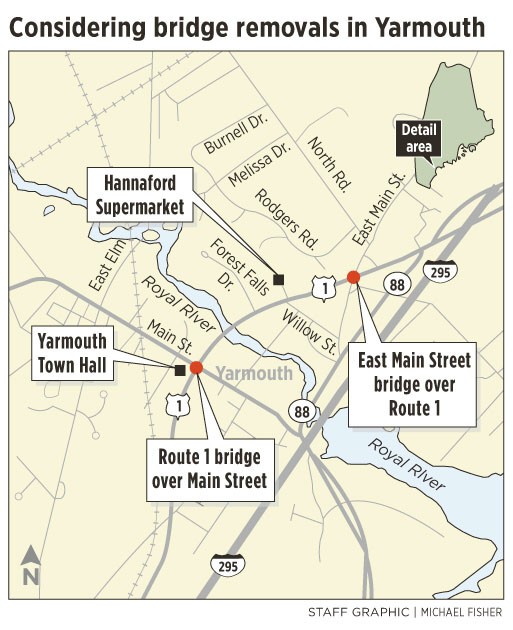Yarmouth is considering ambitious zoning changes that would extend the quaint village character of the town’s historic Main Street to its Route 1 commercial corridor.
Recent community brainstorming sessions produced a vision for development along the highway that includes the possibility of removing the Route 1 bridge over Main Street and the East Main Street bridge over Route 1.
In the decades ahead, proponents say, Route 1 would evolve into a relaxed boulevard with a grassy, tree-lined median, inviting sidewalks and side streets, and a direct connection to Main Street.
A consulting firm is developing a whole new zoning code for the town’s two-mile stretch of Route 1, between exits 15 and 17 of Interstate 295. If the zoning is approved, future buildings will be close to the road and have as many as four stories, with parking behind and mixed residential and commercial uses.
“The idea is not just to take out the bridges, but to transform the Route 1 corridor from the highway that it is to the avenue it could be,” said Vanessa Farr, the town planner.
Yarmouth’s consultant in developing new zoning is Town Planning & Urban Design Collaborative, which has offices in Gardiner; Nashville, Tenn.; Los Angeles; Baltimore; and Rosemary Beach, Fla.
The firm is expected to deliver a draft Route 1 zoning code in about six weeks, Farr said. The town will hold public hearings on the proposal and likely recommend changes before the Town Council votes on whether to adopt the code.
The firm has already produced drawings that reflect a future vision of Route 1. They were presented at the end of four community planning sessions held this month. Each session attracted 75 to 100 residents and many local officials, including all seven town councilors.
“We asked people to consider what we can we do to infuse the character and energy of the village into the Route 1 corridor,” Farr said.
Bruce Butler, an architect who lives and works in town, participated in the sessions.
“I thought the whole experience was incredibly good,” he said. “It created a new paradigm for looking at Route 1. It was great to see big concepts, like removing the bridge at Main Street, being considered as possibilities. And it was amazing to see renderings of what our town could look like 25 years from now.”
The council will decide whether to incorporate the drawings into the town’s master plan, Farr said.
Butler said one of the consultants asked residents to consider where they take visitors when they show them around Yarmouth. Most said they go to Main Street, which is lined with quaint shops and historic buildings, rather than Route 1, which features commercial strip malls and chain retailers and service providers, such as Hannaford, Rite Aid and Tire Warehouse.
Like Butler, Michael Cardente said the community sessions were promising. A broker with Cardente Real Estate in Portland, he represents several property owners in town, including his own family, which owns the Tire Warehouse site.
“It was a first step in making zoning easier for developers to move forward with development,” Cardente said. “It gave everyone a lot to think about and allowed us to begin talking about making Route 1 more pedestrian-friendly. It made it clear that there are more possibilities for Route 1 than what we grew up with.”
Cardente said some property owners were concerned about the impact that such long-range planning will have on current property values, leasing opportunities and development potential. Other participants were concerned that removing the bridges and creating intersections with Route 1 might have a negative effect on the village’s historic character.
Cardente said he has mixed emotions about removing the Route 1 bridge over Main Street. He said many residents have fond memories of crowding under the bridge whenever it rained during the annual Yarmouth Clam Festival.
Still, he said, removing the bridge is a valid option to consider, especially if the town considers replacing it in the near future.
“Whatever is done needs to protect the historic nature of our Main Street and maybe make it possible to transition that onto Route 1,” Cardente said.
Town Manager Nat Tupper said the town will someday face the question of replacing or removing the Main Street bridge, which was built in the 1940s and is lined with plywood to prevent debris from falling on cars and pedestrians below.
Farr said the Route 1 bridge over Main Street carries about 14,700 vehicles per day, which is about 20 fewer than the traffic count on Main Street in Freeport Village. Traffic on Route 1 in Yarmouth is expected to decline after the Maine Department of Transportation makes planned improvements to exits 15 and 17, including the addition of a northbound on-ramp at Exit 15.
If the Main Street and East Main Street bridges were removed, each street would connect directly to Route 1. Participants in the community sessions also discussed the possibility of extending North Street to Route 1, through Estabrook’s gardening center property on East Main Street, which would open up a new area to economic development. “The days when we needed Route 1 to be a big, wide highway are gone,” Farr said. “This isn’t just pie-in-the-sky stuff. This is real economics.”
Staff Writer Kelley Bouchard can be contacted at 791-6328 or at:
kbouchard@pressherald.com
Send questions/comments to the editors.




Success. Please wait for the page to reload. If the page does not reload within 5 seconds, please refresh the page.
Enter your email and password to access comments.
Hi, to comment on stories you must . This profile is in addition to your subscription and website login.
Already have a commenting profile? .
Invalid username/password.
Please check your email to confirm and complete your registration.
Only subscribers are eligible to post comments. Please subscribe or login first for digital access. Here’s why.
Use the form below to reset your password. When you've submitted your account email, we will send an email with a reset code.